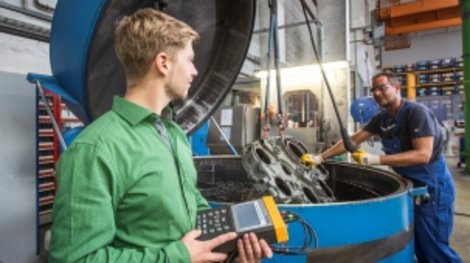The power of measurements

The future potential of energy and resource efficient production
Everyone has to save power. This is old news. Due to both the turnaround in energy policy and constantly increasing competition, companies are only fit for the future if they make their processes energy efficient. Finding the right ways to do this and identifying the real energy guzzlers is not easy at all. Employees in the ER-WIN innovation cluster at Fraunhofer IFF Magdeburg went in search at MTU Reman Technologies GmbH Magdeburg and were able to present amazing results.
“We have a different approach than classic energy advisors,” explains Dipl.-Wirt.-Ing. Marc Kujath from ER-WIN. “Thanks to a holistic way of looking at things, we can map the resource consumption from all the value chains or just the individual components”. During the analysis phase, every single machine is tested and the energy consumption is measured. What’s more exciting though is looking at the entire production process down to differentiating the components. For example, the preparation of a crankcase will produce different energy consumption at the individual stations to the preparation of a cylinder head.
For MTU Reman Technologies GmbH, who develops methods and processes for preparing diesel and gas engines, this approach produced new findings. “Before this project, we had in fact focused on other areas of production as the biggest energy guzzlers,” reports Martin Altrock, maintenance and energy manager at MTU Reman Technologies GmbH. The measuring systems already used were only able to highlight energy saving potential on a selective basis. By mapping the energy consumption of the entire value chain, the process can now be better assessed and managed.
The close networking between science and business cannot just be found at a factual level in this example. The short distances between the research institutes, educational institutions and companies in Saxony-Anhalt is a clear advantage for strengthening the state’s locations.
One particular focus of the research work by ER-WIN is on clear practical relevance and economic feasibility. “There’s no point in developing wonderful visions that nobody can afford afterwards,” says Kujath. Instead, there has to be a healthy cost/benefit ratio even if this cannot always be clearly quantified. In the case of the project with MTU Reman Technologies GmbH, the cooperation resulted in the foundation being laid for the company’s certification in accordance with DIN EN ISO 50.001. This standard for the introduction of a systematic energy management system is a prerequisite for partial exemption from the EEC surcharge. With energy intensive production, this definitely leads to high savings in costs.
“Investments in the current production process have to amortise within a very short space of time, otherwise these measures would not be economically feasible,” confirms Altrock. The use of district heat for process water heating is this kind of investment, and it is now being checked by MTU Reman Technologies GmbH for implementation as a result of the project. Martin Altrock also received considerable inspiration for future investments from the ER-WIN project. For example, the future development of thermal stripping was able to be planned energy and resource efficiently right from the start.
“We want to highlight opportunities and focus more on future developments,” Marc Kujath explains their systematic approach. As a result, production is being sustainably improved through various energy efficiency steps. Future visions are energy-optimised industrial and business parks where the companies use energy and resources optimally due to sophisticated networking. Kujath sees one of the ER-WIN innovation cluster’s tasks as being to transfer the latest trends and knowledge from science and research to companies. As a result, Saxony-Anhalt is always up-to-date on energy issues and will also take a pioneering role in their development in the future.
